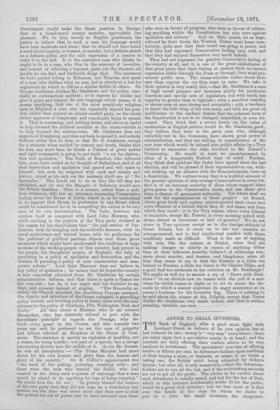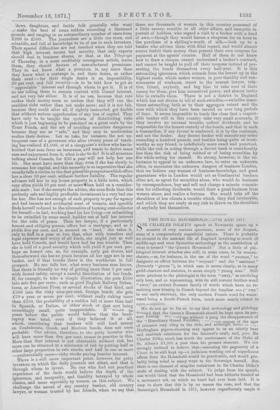ADVICE TO SMALL INVESTORS.
*_dows, daughters, and feeble folk generally who want t.s make the best of sums seldom exceeding a thousand pounds, and ranging in an extraordinary number of cases from £200 to £500. The journalists are a little too stern, and scientific, and full of knowledge to be of use to such investors. Their special difficulties are not touched when they are told that high interest means bad security, that only experts should deal in business shares, or that, as the Telegraph of Thursday, in a most creditably courageous article, warns them, they should beware of manufactured premiums. They do not know what a premium is, any more than
i
they know what a contango s, and their desire, or rather their need — for their single desire is an impossibility, 20 per cent. and full security—is to be told how to get an " appreciable " interest and through whom to get it. It is of no use telling them to remain content with Consol interest, and not very fair either. It is of no use, because that rate makes their money seem so useless that they will run the maddest risks rather than not make more; and it is not fair, because they could after all, if rightly instructed, get double that without serious apprehension of any loss of capital. They have only to be taught the system of distributing risks which is just beginning to be practised on a great scale by the Trust Funds, and the art of avoiding securities dangerous because they are so "safe," and they may in moderation realize their desires. Let us take, for instance, the not un- frequent case of a governess who after wenty years of teach- ing has realized £1,000, or of a clergyiean's widow who has in- herited that sum from an insurance, and wants to derive some ease and enjoyment from it, what is sho to do ? It is all nonsense talking about Consols, for £33 a year will not help her one bit. She must have more than that, even if she has slowly to consume her capital, and this necessity is so imperative that she usually falls a victim to the first plausible prospectus which offers her a clear 10 per cent. without further liability. The regular advisers tell her to try house property in a little town, which very often yields 10 per cent. or more then held on a consider- able scale ; but if she accepts the advice, she soon finds that this perfectly safe and highly profitable investment is a very bad one for her. She has not enough of such property to pay for agency and bad tenants and accidental want of tenants, and speedily finds herself reduced to the alternative of turning rent-collector for herself—in fact, working hard for her living—or submitting to be swindled by some small .builder out of half her interest for the sake of peace. Then her lawyer, if a particularly honest and obliging person, offers her a mortgage, and as it yields five per cent. and is secured on "land," she takes it, only to fin in a year or two that, what with transfers and legal expenses and worry of all kinds, she might just as well have held Consols, and would have had far less trouble. Then she is told of a good security which will yield 8 per cent, per- haps an honest one, as, for example, early gas shares, and thenceforward she has no peace because all her eggs are in one basket, and if that breaks there is the workhouse in full prospect. No one tells her, what every business man knows, that there is literally no way of getting more than 5 per cent. with decent safety, except a careful distribution of her funds. If, for example, to take a simple illustration, she puts £500 into safe five per cents., such as good English Railway Deben- tures, or American Fives, or several stocks of that kind, and £500 into the risky nine-per-cent, foreign bonds, she gets £70 a year, or seven per cent., without really risking more than £250, the probability of a sudden fall of more than half in Spanish, or Italian, or other stock of that sort being exceedingly small, quite inappreciable. It vvosia be years before the public would believe that the bank- ruptcy was total, even if they believed it at all, which, considering that bankers will still lend money on Confederate, Greek, and Mexican bonds, does not seem probable. Our advice, therefore, to the petty investor who will have more than five per cent, comes in practice to this. More than that interest is not obtainable without risk, but more can be obtained at a minimum of risk by putting half or other large proportion in safe stocks, and half in one or more —preferentially more—risky stocks paying heavier interest. There is a still more important point, however, for petty investors on which the daily journals are silent, and that is through whom to invest. No one. who had not practical experience of the facts would behave the depth of the ignorance, and incapacity, and timidity betrayed by whole classes, and more especially by women, on this subject. We challenge the assent of any country banker, old country lawyer, or woman trusted by her friends, when we say that there are thousands of women in this country possessed of a little money, sensible in all other affairs, and energetic in pursuit of hobbies, who regard a visit to a broker with a kind of awe,—though they would harass a shopman for an hour in the purchase of a shilling's-worth of silk,—look up to a banker who advises them with filial regard, and would almost sooner forfeit their money than present their own coupons for payment at the agents' counter. Half of them do not know how to draw a cheque, cannot understand a broker's contract, and cannot be taught to pull off their coupons instead of pre- senting the bonds themselves every half-year. It is this astounding ignorance, which extends from the lowest up to the highest ranks, which makes women, in pure timidity and con- sciousness of weakness, resort to the nearest lawyer, rela- tive, friend, anybody, and beg him to take care of their money for them, give him unreserved power, and almost invite him to swindle them. There is not a district in England which has not stories to tell of such swindles,—swindles some- times astounding, both as to their aggregate extent and the ease with which they have been carried on over long periods of time. It seems impossible to teach the class that a respect- able banker will in this country take very small accounts, if' they involve no unusual trouble, collect dividends, and be responsible for the honest custody of the bonds, and that in such a transaction, if any favour is conferred, it is by the customer, and not the dealer. Any decent broker will execute any order exceeding a hundred pounds, and besides being quite as trust- worthy as any friend, is indefinitely more exact and punctual, while the risk in acting through a decent bank is considerably leas than the risk of being robbed or of losing securities by fire while acting for oneself. So strong, however, is the re- luctance to appeal to an unknown face, to enter an unknowi. office, to encounter the unknown dangers of business London, that we believe any woman of business-knowledge, and good guarantees who in London would act as Continental bankera often act, as agent for securities alone, who would do business by correspondence, buy and sell and charge a minute corunais- sioia for collecting dividends, would draw a great business from women alone, and realize a fortune. She would take off the shoulders of her clients a trouble which they find intolerable, and which they are ready at any risk to throw on the shoulders of anybody but themselves.



































 Previous page
Previous page